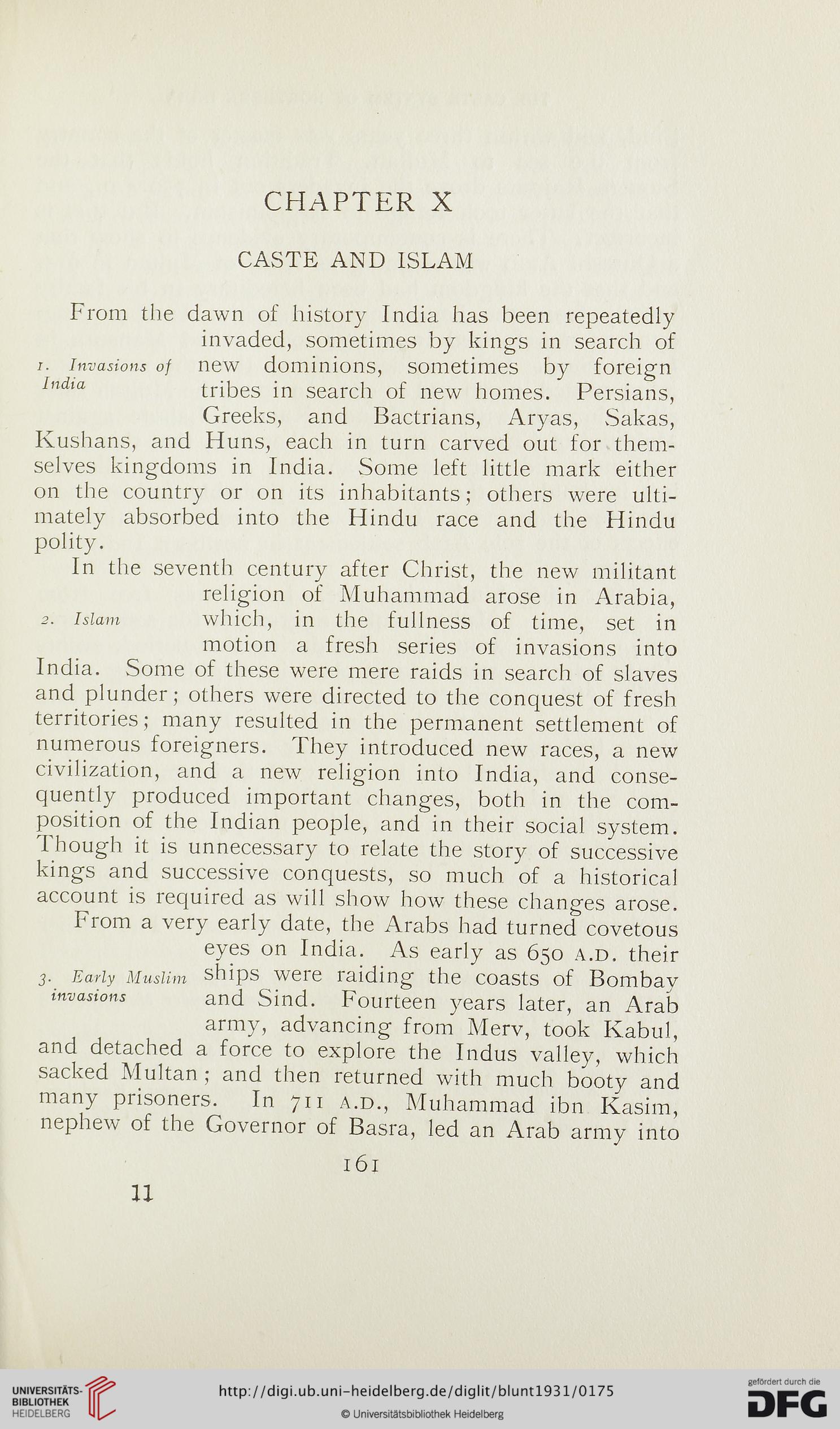CHAPTER X
CASTE AND ISLAM
Frorn the dawn of history India has been repeatedly
invaded, sometimes by kings in search of
1. invasions of new dominions, sometimes by foreign
India tribes in search of new homes. Persians,
Greeks, and Bactrians, Aryas, Sakas,
Kushans, and Huns, each in turn carved out for them-
selves kingdoms in India. Some left little mark either
on the country or on its inhabitants; others were ulti-
mately absorbed into the Hindu race and the Hindu
polity.
In the seventh century after Christ, the new militant
religion of Muhammad arose in Arabia,
2. isiam which, in the fullness of time, set in
motion a fresh series of invasions into
India. Some of these were mere raids in search of slaves
and plunder; others were directed to the conquest of fresh
territories; many resulted in the permanent settlement of
numerous foreigners. They introduced new races, a new
civilization, and a new religion into India, and conse-
quently produced important changes, both in the com-
position of the Indian people, and in their social system.
Though it is unnecessary to relate the story of successive
kings and successive conquests, so much of a historical
account is required as will show how these changes arose.
From a very early date, the Arabs had turned covetous
eyes on India. As early as 650 a.d. their
3. Eariy Musiim ships were raiding the coasts of Bombay
invasions and Sind. Fourteen years later, an Arab
army, advancing from Merv, took Kabul,
and detached a force to explore the Indus valley, which
sacked Multan ; and then returned with much booty and
many prisoners. In 711 a.d., Muhammad ibn Kasim,
nephew of the Governor of Basra, led an Arab army into
161
CASTE AND ISLAM
Frorn the dawn of history India has been repeatedly
invaded, sometimes by kings in search of
1. invasions of new dominions, sometimes by foreign
India tribes in search of new homes. Persians,
Greeks, and Bactrians, Aryas, Sakas,
Kushans, and Huns, each in turn carved out for them-
selves kingdoms in India. Some left little mark either
on the country or on its inhabitants; others were ulti-
mately absorbed into the Hindu race and the Hindu
polity.
In the seventh century after Christ, the new militant
religion of Muhammad arose in Arabia,
2. isiam which, in the fullness of time, set in
motion a fresh series of invasions into
India. Some of these were mere raids in search of slaves
and plunder; others were directed to the conquest of fresh
territories; many resulted in the permanent settlement of
numerous foreigners. They introduced new races, a new
civilization, and a new religion into India, and conse-
quently produced important changes, both in the com-
position of the Indian people, and in their social system.
Though it is unnecessary to relate the story of successive
kings and successive conquests, so much of a historical
account is required as will show how these changes arose.
From a very early date, the Arabs had turned covetous
eyes on India. As early as 650 a.d. their
3. Eariy Musiim ships were raiding the coasts of Bombay
invasions and Sind. Fourteen years later, an Arab
army, advancing from Merv, took Kabul,
and detached a force to explore the Indus valley, which
sacked Multan ; and then returned with much booty and
many prisoners. In 711 a.d., Muhammad ibn Kasim,
nephew of the Governor of Basra, led an Arab army into
161




